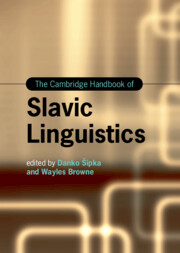Book contents
- The Cambridge Handbook of Slavic Linguistics
- Cambridge Handbooks in Language and Linguistics
- The Cambridge Handbook of Slavic Linguistics
- Copyright page
- Contents
- Figures
- Tables
- Contributors
- Introduction
- Part 1 Prosody and Phonology
- Part 2 Inflectional and Derivational Morphology
- 7 Inflectional Endings: Declensions
- 8 Inflectional Endings: Conjugation
- 9 Tense and Mood Forms
- 10 Aspect in Verbs
- 11 Lexical Derivation
- 12 Lexical Composition
- Part 3 Syntax
- Part 4 Lexicon
- Part 5 Sociolinguistic and Geographical Approaches
- Part 6 Experimental and Quantitative Approaches
- Name Index
- Subject Index
- References
8 - Inflectional Endings: Conjugation
from Part 2 - Inflectional and Derivational Morphology
Published online by Cambridge University Press: 16 May 2024
- The Cambridge Handbook of Slavic Linguistics
- Cambridge Handbooks in Language and Linguistics
- The Cambridge Handbook of Slavic Linguistics
- Copyright page
- Contents
- Figures
- Tables
- Contributors
- Introduction
- Part 1 Prosody and Phonology
- Part 2 Inflectional and Derivational Morphology
- 7 Inflectional Endings: Declensions
- 8 Inflectional Endings: Conjugation
- 9 Tense and Mood Forms
- 10 Aspect in Verbs
- 11 Lexical Derivation
- 12 Lexical Composition
- Part 3 Syntax
- Part 4 Lexicon
- Part 5 Sociolinguistic and Geographical Approaches
- Part 6 Experimental and Quantitative Approaches
- Name Index
- Subject Index
- References
Summary
The Slavic languages are fusional. Categories include person, gender, number, tense, aspect, and mood. We concentrate on endings for non-past, compound tenses, aorist, imperfect, and imperative, starting from Proto-Slavic (PSL), with reference to Proto-Indo-European (PIE). The time lapse between PIE and PSL is vast, so details are largely unrecoverable. The situation in the modern Slavic languages is sketched, summarizing secondary and primary endings, roots, themes, and thematic and athematic formations. The PIE present, aorist, and optative are outlined. Morphological persistence, innovation, and loss are evident from the data, and analogy plays an important and expected role. Attention is drawn to uncertainties in the origins of the various endings, uncertainties which on the whole have been pointed out, though much is open to research and discussion. Overall, the general state of the art in the field is well-established, but there is scope for further investigation, as becomes even clearer once viewed alongside other chapters.
Keywords
- Type
- Chapter
- Information
- The Cambridge Handbook of Slavic Linguistics , pp. 161 - 178Publisher: Cambridge University PressPrint publication year: 2024

